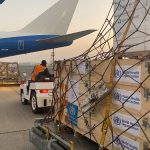Kales Group: Carving a niche legacy in the GSSA industry
Representing more than 70 airlines and collectively moving over 200,000 tons of cargo and handling over 100,000 passenger tickets per annum, Kales is further expanding its global reach.
“For us, the emphasis goes beyond mere cost reduction. It’s about solving the entire cargo puzzle. Our entrepreneurial spirit and agility are what truly set us apart in the industry. Our lean structure fosters direct communication, enabling us
to live and breathe air cargo. ‘No’ is not in our dictionary.”
– Kales Group CEO Sebastiaan Scholte
 With a legacy spanning over two decades, Kales Group—an independent entity boasting over 185 local employees and a growing network of 39 companies—stands as a formidable force in the aviation industry, serving as a General Sales and Services Agent (GSSA).
With a legacy spanning over two decades, Kales Group—an independent entity boasting over 185 local employees and a growing network of 39 companies—stands as a formidable force in the aviation industry, serving as a General Sales and Services Agent (GSSA).
Since its establishment in 1994, the company has charted a path of success, intricately looking after the entire order-to-cash process and prioritizing the growth of its partner airlines.
Representing a dynamic consortium of over 70 airlines in cargo-passenger and charter services, Kales Group, which is based at Schiphol Airport, Europe’s third-largest cargo hub, operates seamlessly through a vast network of 58 offices spread across 30 countries. This expansive reach not only showcases the company’s global footprint but underscores its passion for flexibility, personalized service, and steadfast support.
Remarkably, Kales handled nearly 200,000 tons of cargo last year, surpassing pre-COVID levels and achieving market share growth. This accomplishment is not solely attributable to market expansion but reflects Kales’ success in gaining a larger slice of the market.
As a GSSA, Kales Group distinguishes itself by emphasizing a holistic approach that goes beyond cost reduction. The company’s strategy revolves around optimizing profitability and quality, aiming to provide airlines with a higher yield, generating more revenues at a lower cost while maintaining high-quality services.
A significant benefit for airlines partnering with Kales is the elimination of fixed costs. By avoiding the need for offices, staff, and investments in infrastructure, airlines can maximize profits in good times and maintain financial flexibility in challenging periods. This absence of operational costs provides airlines with a key advantage, allowing them to externalize their costs, making them variable and enhancing overall flexibility.
Revenue Breakdown: Cargo Takes the Lead
In terms of revenue breakdown between passenger and cargo services, Kales Group emerges as a predominantly cargo-driven GSSA. Cargo constitutes over 90% of the company’s total revenues, underscoring its prowess in the air cargo domain.
While passenger services faced challenges during the COVID pandemic, with a significant drop in air travel, there’s now a notable rebound in passenger volumes. An intriguing aspect is the 10% increase in general load factors for passengers compared to pre-pandemic levels, leading to higher ticket pricing and indicating a positive trend. Despite this, Kales Group maintains its primary focus on tonnage in its pursuit of excellence in the air cargo industry.
Diverse Cargo Portfolio: From Machinery to Perishables
An influential factor in Kales’ operations is the rapid growth of e-commerce, particularly in its relationship with China. Notably, the cargo flows from China to Europe, and Kales maximizes the available capacity on return flights from Europe to China. While not directly selling e-commerce services, the company strategically leverages the capacity generated by e-commerce shipments, commercializing it for general cargo purposes.
Kales manages a diverse cargo portfolio, spanning a wide array of goods. From machinery to luxury items, and even perishables, the company caters to a spectrum of cargo needs. While perishable items constitute a smaller portion, Kales handles them with precision, including a substantial volume of fish shipments.
In a candid conversation with Air Cargo Update, Kales Group CEO Sebastiaan Scholte reveals core strategies that distinguish the GSSA in the competitive air cargo industry.
Operational Excellence Beyond Cost Reduction
“For us, the emphasis goes beyond mere cost reduction; it’s about solving the entire cargo puzzle,” says Scholte. He articulates a strategy focused on optimizing profitability and quality, positioning the company as a partner dedicated to providing airlines with a higher yield. “Our entrepreneurial spirit and agility are what truly set us apart in the industry,” he adds, emphasizing their unique operational structure.
Operating through 58 offices in 30 countries, each managed by directors treating them as their own businesses, Kales differentiates itself from larger, bureaucratic organizations. “Our lean structure fosters direct communication, enabling us to live and breathe air cargo. ‘No’ is not in our dictionary,” Scholte proudly states. Kales prides itself on 24/7 availability, agility, and quick responses, embodying a culture where ‘no’ is not in their dictionary.

AI’s Transformative Potential in Air Cargo
“In our vision, AI holds significant potential, particularly for e-commerce companies dealing with return shipments,” states Scholte. AI can proactively advise customers, reducing the need for returns and optimizing operational efficiency. Additionally, AI connects stakeholders in the air cargo industry, enhancing predictability through insights and information sharing. “By identifying patterns and optimizing planning, AI contributes to better outcomes for the industry,” he explains.
Skillset and Cohesive Collaboration
When it comes to expertise, Kales Group stands out for its diverse team and commitment to continuous learning and innovation. Scholte sheds light on the company’s approach to training, upskilling, and staying abreast of new technologies, highlighting plans to share this wealth of knowledge as a potential strategic partner.
“Our team at Kales hails from diverse sectors of the industry, bringing a wealth of experience to the table,” Scholte says.
He emphasizes the company’s impressively low attrition rates, attributing the success to continuous training—an integral part of their approach. Learning isn’t confined to the company. As Scholte pointed out, they glean insights from the airlines themselves, particularly smaller carriers.
Representing 70 airlines, Kales has a unique vantage point in the best practices of each carrier, aiming to blend these insights for an optimal airline experience.
A distinctive capability showcased by Kales is Total Cargo Management (TCM). Scholte clarifies that TCM, far from being a mere buzzword, involves completely relieving airlines of their cargo operations. An example is the Total Cargo Management for Norse Atlantic Airlines, where Kales handles every aspect of a low-cost airline’s cargo operations, from IT systems and operational tasks to auditing, sales, billing, and even involvement in planning.
Addressing commercial planning processes like pricing and revenue management, Scholte clarifies that their approach is macroeconomic, focusing on larger corporations diversifying their supply chains. “While we don’t instruct companies on where to conduct their operations, we actively engage in developing our own solutions,” he emphasizes. Collaborating with dedicated partners, they optimize digital tools to cater to the specific needs of their customers, reflecting their commitment to innovation.
Air Cargo Market Dynamics and Post-COVID Trends
Scholte sheds light on the choice between air and sea freight, dispelling the misconception that air freight is always more expensive. “It’s essential to clarify that air freight can be more cost-effective for specific goods with high-value density,” he emphasizes, challenging traditional beliefs. In the post-COVID landscape, perishable goods and the pharmaceutical sector thrive in the air cargo market. “Our focus on reliability and innovation positions us strongly in these growing markets,” Scholte concludes, highlighting Kales Group’s commitment to shaping the future of air cargo.
Consultancy and Strategic Partnerships
Scholte is keen on leveraging Kales’ expertise beyond its current operations. “Certainly, it’s all about the interconnectedness of our operations,” he noted. Kales isn’t confined to selling from a single location; instead, their reach extends to wherever the airlines operate, even in regions where they don’t have a direct presence. The company establishes connections and effectively manages operations in those areas as well, forming a core part of its strategy.
“This approach is a core part of our strategy, and we are eager to further expand on it,” Scholte emphasizes. Whether it’s a startup or an existing carrier with cargo operations, if an airline is looking to streamline its processes and outsource cargo management to experts with a deep focus on this field, Kales Group is well-equipped and enthusiastic to take on the task. The vision is clear—collaborative excellence, continuous innovation, and a commitment to being a strategic partner in shaping the future of air cargo.
Strategic Network Planning for Revenue Optimization
Network planning is a critical aspect where Kales excels. Unlike some airline cargo departments, the company places a strong emphasis on optimizing revenues through informed choices in destination planning. Scholte explains, “By suggesting flying to one destination over another, we can significantly enhance revenue generation.” This collaborative approach ensures that Kales works hand-in-hand with airlines to make choices that align with the airline’s best interests.
Environmental Sustainability Efforts: A Dual Focus on Technology and Operations
According to Scholte, sustainability is a vital aspect of Kales Group’s strategy. “We focus on aircraft engines, airplanes, and innovations related to fuel, including biofuels and other technologies. These are key elements of our sustainability strategy,” he says, noting that the company places a strong emphasis on efficient cargo management.
Scholte further said, “Optimizing load factors from, say, 60% to 70% results in a one-sixth or one-seventh reduction in total emissions per kilo, making a significant positive environmental impact.”
He underscores that this commitment goes beyond rhetoric. “This may sound like a sales pitch, but it’s indeed true. Higher load factors translate to more eco-friendly solutions per kilo of cargo,” Scholte emphasizes.
Scholte believes in the positive impact of improved collaboration within the supply chain. “Fewer trucks waiting and higher load factors contribute to fewer trucks on the road. In essence, the better we can cooperate and streamline our supply chain operations, the more beneficial it is for the environment,” he states.
The Future of Kales Group: Growth Trajectory and Global Expansion
Discussing the company’s growth trajectory, Scholte notes, “Our growth trajectory is certainly on an upward trend, with an increasing number of airline partnerships.” Despite industry trends, Kales Group observes a different pattern. “Airlines are still inclined to reduce costs and operate as lean as possible, which often involves outsourcing. We find ourselves at a crossroads in this regard.”
Geographical expansion is a key agenda. Scholte expresses, “We are actively exploring opportunities in Asia and Latin America. Our geographical focus for expansion lies in these regions, with recent growth in India. Looking ahead over the next five years, we aim to establish even more partnerships with carriers.”















